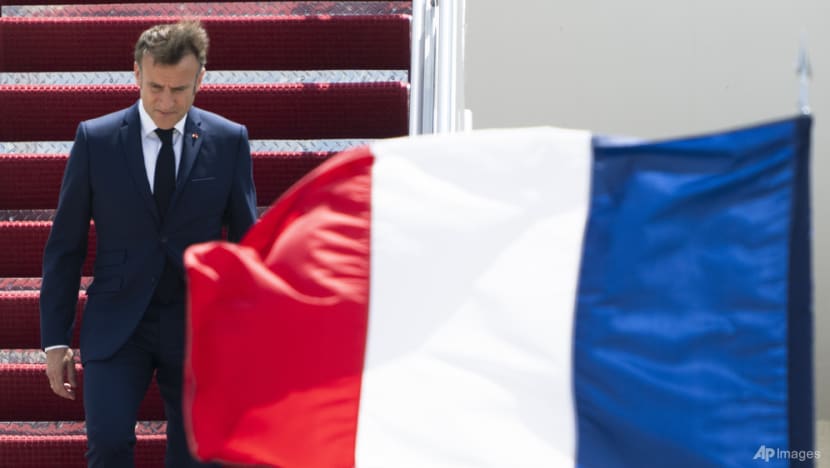Commentary: More than French domestic politics, Macron’s failed election gamble has global effects
France has kept the far-right from taking power, but Emmanuel Macron may be a lame-duck president at a time when European leadership is needed to engage the United States and China in a meaningful way, says S Rajaratnam School of International Studies’ Pascal Vennesson.

French President Emmanuel Macron arrives Jul 10, 2024, at Andrews Air Force Base to attend the NATO summit in Washington. (AP Photo/Manuel Balce Ceneta)

This audio is generated by an AI tool.
SINGAPORE: French President Emmanuel Macron’s gamble to force unity through a snap election has failed. France looks more divided than ever after Sunday (Jul 7) and his own power is now diluted.
None of the three largest political blocs has enough seats to form a government on their own. The left-wing alliance New Popular Front (NFP) came in first by a small margin, while Mr Macron’s centrist Ensemble beat expectations to get ahead of the far-right National Rally (RN) party. But why should this matter to anyone outside the fray of French domestic politics?
One of Europe’s largest countries and a permanent member of the United Nations Security Council is heading for gridlock or political instability for the next three years, until Mr Macron’s final term ends in 2027.
The electoral result in France matters globally, for three reasons.
POPULISM ALIVE AND WELL, ON LEFT AND RIGHT
First, the French parliament election shows the political clout of populism remains strong globally - on both ends of the spectrum.
While many are relieved that voters denied the nationalist, anti-immigration RN party a majority, its success and growing influence cannot be denied. In 2017 at the beginning of Mr Macron’s first term, the far-right party had eight seats in parliament; today, it has 143 - its highest score ever.
The unexpected surge of the left brings to the fore a platform that has its own populist undertones with its “tax the rich and spread the wealth” agenda and a promise to flout European Union fiscal rules if necessary. While a far-right government has been avoided in the short term, this election does not mark the end of anti-establishment politics.
DIVIDED ON FOREIGN POLICY
Second, there will likely be more uncertainty in French and European external relations. The New Popular Front is internally divided on a range of major foreign policy issues.
The far-left France Unbowed party and the Communist party have adopted “sovereignist” views and want to prioritise wresting more control back from the EU, while the Socialist Party and the Greens are generally pro-European Union and pro-NATO (North Atlantic Treaty Organization). The NFP’s programme does not say anything about NATO and is generally critical of some of the EU’s core priorities such as budgetary stability, free trade or industrial policy.
Although the NFP’s overall support for Ukraine has become clearer and explicitly favours arms delivery, this position differs from the more lukewarm views among France Unbowed supporters, leading to questions about which policy will actually be implemented. This will be important, given the uncertainty of American support for Ukraine after its own presidential election in November.
Reinventing some sort of foreign policy consensus out of these disparate views, and finding ways to convince European partners, will be challenging.
BUMPS AHEAD IN EUROPE’S "THIRD WAY" FROM US AND CHINA
Third, in the short term, this election could diminish European leadership and influence globally, at a time when Europe seeks to be a strategic “third way” from the United States and China.
Both France and Germany’s governing parties have been seriously weakened, making European leadership less likely on a range of challenging policy issues ranging from EU expansion and reform, wars in Ukraine and Gaza, immigration and energy transition.
Mr Macron, while deeply unpopular, may still be able to exert some influence in international and military affairs, the traditional preserve of the president in the Fifth Republic. Still, either scenario of a coalition or a minority government is likely to severely curtail Mr Macron’s capacity to take credible and substantial European and international initiatives.
Weaker French and European political leadership is accentuated by serious economic and financial concerns.
In June, the European Commission rebuked France and six other countries for excessive debt. France's debt has surged to over 110 per cent of its gross domestic product, resulting in a significant budget deficit.
Before the election, the government cautioned that this year's growth would fall short of expectations as it planned to reduce spending by over €20 billion (US$21.7 billion). The programmes of the winning parties suggest that the figures for the state budget deficit, inflation, and foreign trade are likely to worsen.
To be sure, a coalition may, in due course, impose moderation. Much will depend on the personality and acumen of the specific individuals who will become prime minister, foreign minister and minister of the armed forces.
French citizens would not look favourably on public discord between the president and prime minister on the world stage - whether they agree with one or the other, or quite possibly, neither. Moreover, presidential hopefuls across the political spectrum will have few incentives to weaken the presidency that they covet.
Certainly, these problems were already simmering before Mr Macron’s failed gambit. But they are now out in the open and the effects of the current political uncertainty will be surely be felt in the coming years.
Dr Pascal Vennesson is Senior Fellow and Head of Research at the S Rajaratnam School of International Studies (RSIS), Nanyang Technological University, Singapore.











.jpg?itok=mw7NYi7A)








